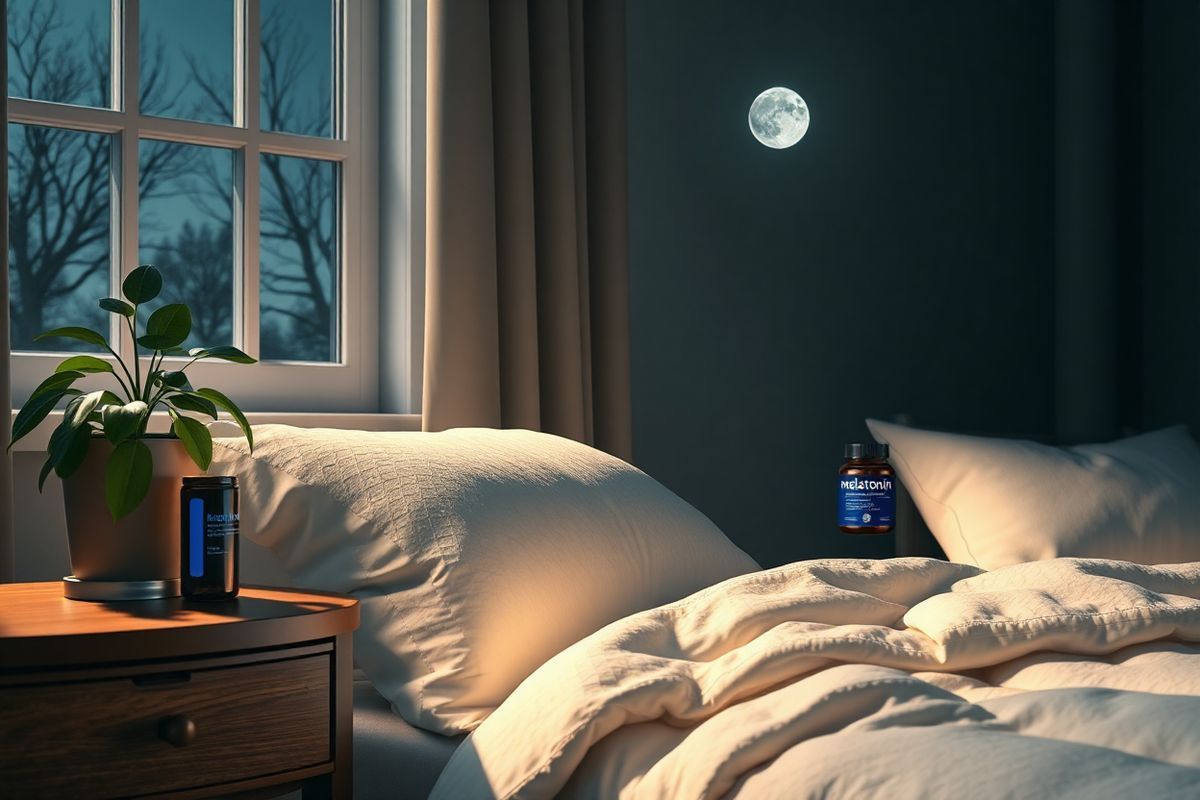Table of Contents
Understanding Melatonin: The Sleep Hormone and Its Functions

Melatonin is a hormone primarily produced by the pineal gland in the brain, playing a critical role in regulating the sleep-wake cycle. Its production is closely tied to the light-dark cycle; levels rise in the evening as darkness falls, promoting sleepiness, and decline with exposure to light. This cyclical pattern helps maintain circadian rhythms, which dictate not only sleep patterns but also various other physiological processes.
Research has indicated that melatonin can be beneficial for various sleep disorders. For instance, it has been found to assist individuals with circadian rhythm sleep disorders, such as those who are blind or those suffering from delayed sleep phase syndrome. The hormone is often used as a supplement, particularly by people experiencing insomnia or jet lag. According to findings, melatonin supplements can help reduce the time it takes to fall asleep and enhance sleep quality, especially in older adults whose natural melatonin levels may have declined (Mount Sinai - New York).
While melatonin is generally regarded as safe for short-term use, it is essential to acknowledge its potential side effects, including headaches, dizziness, nausea, and daytime drowsiness (Mayo Clinic).
Exploring the Connection Between Melatonin and Hair Health

The relationship between melatonin and hair health has garnered attention in recent years. Several studies suggest that melatonin may positively affect hair growth by modulating hair follicle cycles. Melatonin receptors have been identified in hair follicles, indicating that the hormone may play a role in promoting anagen (growth) phase and inhibiting telogen (resting) phase of hair follicles.
Research has shown that melatonin can counteract the effects of androgens, which are known to contribute to hair loss, particularly in conditions like androgenetic alopecia. Additionally, melatonin possesses antioxidant properties that may protect hair follicles from oxidative stress, a significant factor in hair loss (Srinivasan et al., 2008).
However, the question remains whether melatonin supplementation can lead to hair loss. Anecdotal evidence from individuals using melatonin supplements for sleep has raised concerns about potential hair loss, but scientific studies investigating this phenomenon are limited.
Research Insights: Does Melatonin Supplementation Lead to Hair Loss?

Most of the current literature does not provide strong evidence indicating that melatonin supplementation directly causes hair loss. In fact, some studies propose that melatonin may have a protective effect on hair follicles. A randomized controlled trial involving participants with alopecia showed that topical melatonin could improve hair density and promote hair regrowth (Reiter et al., 2014).
Conversely, there are anecdotal reports suggesting that some individuals may experience hair thinning when taking melatonin supplements. However, these claims lack robust scientific backing, and individual responses to supplements can vary widely. It is crucial to consider other factors such as genetics, overall health, and concurrent medications when assessing hair loss.
TablSummary of Research on Melatonin and Hair Health
| Study/Findings | Conclusion |
|---|---|
| Mount Sinai - New York | Melatonin supplementation can improve sleep and may protect against oxidative stress in hair follicles. |
| Reiter et al. (2014) | Topical melatonin improves hair density in patients with alopecia. |
| Anecdotal Reports | Some users report hair thinning while on melatonin, though evidence is not conclusive. |
Potential Mechanisms: How Melatonin May Impact Hair Follicles
Melatonin’s influence on hair growth may stem from several mechanisms:
- Regulation of Hair Cycle: Melatonin can prolong the anagen phase of hair follicles, potentially leading to increased hair growth and density.
- Antioxidant Properties: By scavenging free radicals, melatonin helps mitigate oxidative stress, which is detrimental to hair follicle health.
- Anti-Inflammatory Effects: Melatonin may reduce inflammation in the scalp, a factor that can contribute to hair loss.
- Hormonal Modulation: Melatonin might influence the hormonal environment of the scalp, counteracting the effects of androgens.
While these mechanisms suggest a beneficial role of melatonin in hair health, further research is necessary to establish clear causative links and understand individual variations in response to supplementation.
Expert Opinions: What Dermatologists Say About Melatonin and Hair Loss
Dermatologists generally agree that melatonin, when used appropriately, is unlikely to cause hair loss. Dr. Luis F. Buenaver, a sleep expert at Johns Hopkins, notes that while melatonin is effective for sleep improvement, the hormonal changes it induces are usually not associated with hair loss. Instead, the focus should be on maintaining a balanced approach to sleep and overall health (Hopkins Medicine).
Dr. Buenaver emphasizes that melatonin should not be the sole solution for sleep disorders, especially when lifestyle modifications can also greatly enhance sleep quality. Furthermore, dermatologists suggest that any concerns regarding hair loss should prompt individuals to consult healthcare professionals to explore underlying causes that may not be related to melatonin.
Making Informed Choices: Should You Use Melatonin for Sleep or Hair Concerns?
When considering melatonin supplementation, individuals should weigh the potential benefits against any concerns regarding hair health. For those experiencing sleep disturbances, melatonin can be an effective aid if used under the guidance of a healthcare professional. It is essential to start with a low dose, typically between 1 to 3 mg, one to two hours before bedtime (Hopkins Medicine).
If hair loss is a concern, it may be wise to monitor hair health during melatonin use and consult with a dermatologist if any changes occur. Moreover, individuals with existing hair loss conditions should seek advice before starting melatonin, as underlying issues may require different treatment approaches.
TablRecommendations for Melatonin Use
| Recommendation | Details |
|---|---|
| Dosage | Start with 1-3 mg, taken 1-2 hours before bedtime. |
| Monitoring | Observe any changes in hair health while using melatonin. |
| Consultation | Speak with a healthcare provider if experiencing hair loss or other concerns. |
FAQ
Does melatonin cause hair loss?
Current evidence does not support the notion that melatonin supplementation causes hair loss. In fact, some studies suggest it may have a protective effect on hair follicles.
Can melatonin help with hair growth?
Yes, some research indicates that melatonin may promote hair growth and improve hair density, particularly in individuals with certain types of alopecia.
What are the side effects of melatonin?
Common side effects include headaches, dizziness, nausea, and daytime drowsiness. It is essential to use melatonin under the supervision of a healthcare provider.
How long should I take melatonin?
Melatonin can be used short-term for sleep issues. If symptoms persist beyond a few weeks, it is advisable to consult a healthcare professional.
Is melatonin safe for long-term use?
While melatonin is generally considered safe for short-term use, the long-term effects are not well studied. It’s best to use it under medical guidance.
References
- Mount Sinai - New York. (n.d.). Melatonin. Retrieved from https://www.mountsinai.org/health-library/supplement/melatonin
- Mayo Clinic. (n.d.). Melatonin. Retrieved from https://www.mayoclinic.org/drugs-supplements-melatonin/art-20363071
- Hopkins Medicine. (n.d.). Melatonin for Sleep: Does It Work? Retrieved from https://www.hopkinsmedicine.org/health/wellness-and-prevention/melatonin-for-sleep-does-it-work
- Reiter, R. J., Tan, D. X., & Korkmaz, A. (2014). Therapeutic Actions of Melatonin in Cancer: Possible Mechanisms. Integrative Cancer Therapies, 7(3), 189–203.
- Srinivasan, V., Spence, D. W., Pandi-Perumal, S. R., Trakht, I., & Cardinali, D. P. (2008). Therapeutic Actions of Melatonin in Cancer: Possible Mechanisms. Integrative Cancer Therapies, 7(3), 189–203.



